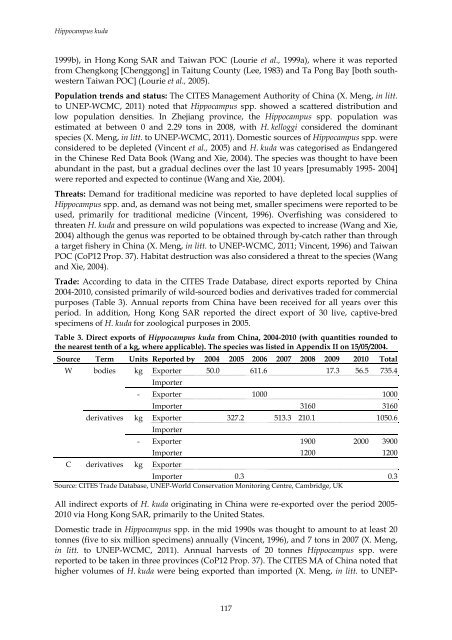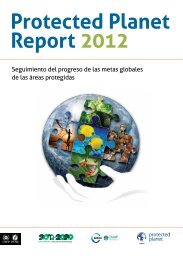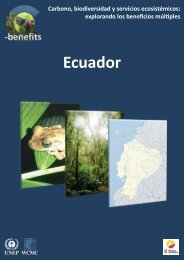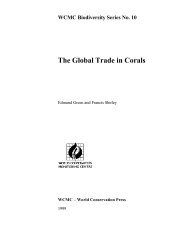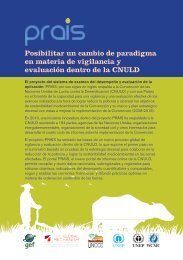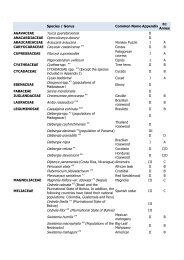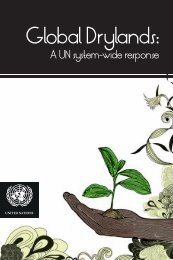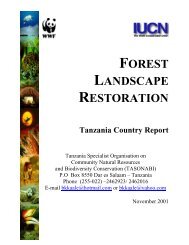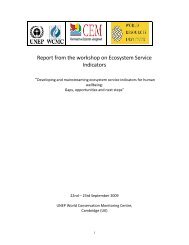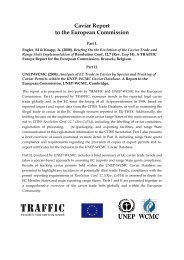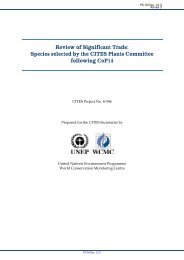2012. Review of Significant Trade - Cites
2012. Review of Significant Trade - Cites
2012. Review of Significant Trade - Cites
You also want an ePaper? Increase the reach of your titles
YUMPU automatically turns print PDFs into web optimized ePapers that Google loves.
Hippocampus kuda<br />
1999b), in Hong Kong SAR and Taiwan POC (Lourie et al., 1999a), where it was reported<br />
from Chengkong [Chenggong] in Taitung County (Lee, 1983) and Ta Pong Bay [both southwestern<br />
Taiwan POC] (Lourie et al., 2005).<br />
Population trends and status: The CITES Management Authority <strong>of</strong> China (X. Meng, in litt.<br />
to UNEP-WCMC, 2011) noted that Hippocampus spp. showed a scattered distribution and<br />
low population densities. In Zhejiang province, the Hippocampus spp. population was<br />
estimated at between 0 and 2.29 tons in 2008, with H. kelloggi considered the dominant<br />
species (X. Meng, in litt. to UNEP-WCMC, 2011). Domestic sources <strong>of</strong> Hippocampus spp. were<br />
considered to be depleted (Vincent et al., 2005) and H. kuda was categorised as Endangered<br />
in the Chinese Red Data Book (Wang and Xie, 2004). The species was thought to have been<br />
abundant in the past, but a gradual declines over the last 10 years [presumably 1995- 2004]<br />
were reported and expected to continue (Wang and Xie, 2004).<br />
Threats: Demand for traditional medicine was reported to have depleted local supplies <strong>of</strong><br />
Hippocampus spp. and, as demand was not being met, smaller specimens were reported to be<br />
used, primarily for traditional medicine (Vincent, 1996). Overfishing was considered to<br />
threaten H. kuda and pressure on wild populations was expected to increase (Wang and Xie,<br />
2004) although the genus was reported to be obtained through by-catch rather than through<br />
a target fishery in China (X. Meng, in litt. to UNEP-WCMC, 2011; Vincent, 1996) and Taiwan<br />
POC (CoP12 Prop. 37). Habitat destruction was also considered a threat to the species (Wang<br />
and Xie, 2004).<br />
<strong>Trade</strong>: According to data in the CITES <strong>Trade</strong> Database, direct exports reported by China<br />
2004-2010, consisted primarily <strong>of</strong> wild-sourced bodies and derivatives traded for commercial<br />
purposes (Table 3). Annual reports from China have been received for all years over this<br />
period. In addition, Hong Kong SAR reported the direct export <strong>of</strong> 30 live, captive-bred<br />
specimens <strong>of</strong> H. kuda for zoological purposes in 2005.<br />
Table 3. Direct exports <strong>of</strong> Hippocampus kuda from China, 2004-2010 (with quantities rounded to<br />
the nearest tenth <strong>of</strong> a kg, where applicable). The species was listed in Appendix II on 15/05/2004.<br />
Source Term Units Reported by 2004 2005 2006 2007 2008 2009 2010 Total<br />
W bodies kg Exporter 50.0 611.6 17.3 56.5 735.4<br />
Importer<br />
- Exporter 1000 1000<br />
Importer 3160 3160<br />
derivatives kg Exporter 327.2 513.3 210.1 1050.6<br />
Importer<br />
- Exporter 1900 2000 3900<br />
Importer 1200 1200<br />
C derivatives kg Exporter<br />
Importer 0.3 0.3<br />
Source: CITES <strong>Trade</strong> Database, UNEP-World Conservation Monitoring Centre, Cambridge, UK<br />
All indirect exports <strong>of</strong> H. kuda originating in China were re-exported over the period 2005-<br />
2010 via Hong Kong SAR, primarily to the United States.<br />
Domestic trade in Hippocampus spp. in the mid 1990s was thought to amount to at least 20<br />
tonnes (five to six million specimens) annually (Vincent, 1996), and 7 tons in 2007 (X. Meng,<br />
in litt. to UNEP-WCMC, 2011). Annual harvests <strong>of</strong> 20 tonnes Hippocampus spp. were<br />
reported to be taken in three provinces (CoP12 Prop. 37). The CITES MA <strong>of</strong> China noted that<br />
higher volumes <strong>of</strong> H. kuda were being exported than imported (X. Meng, in litt. to UNEP-<br />
117


